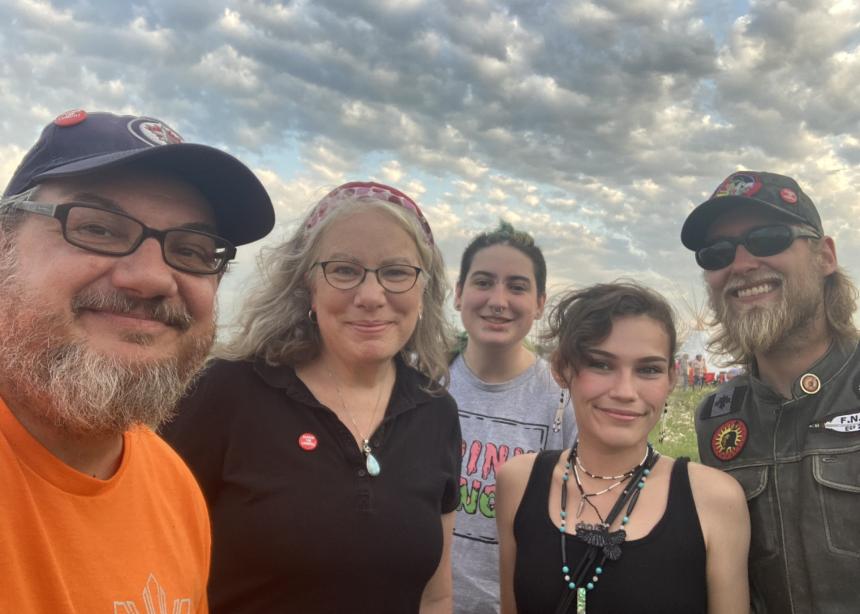For David Driedger, who serves as leading minister at First Mennonite Church in Winnipeg, the Manitoba government’s refusal to fund a search for the remains of two murdered Indigenous women believed to be buried in a landfill feels like a continuity of a pattern.
“These women were not only killed but then discarded like trash,” says Driedger. “It’s sort of that tragic continuity of lives that have been treated as essentially more disposable in our society and culture.”
Winnipeg police believe that Morgan Harris and Marcedes Myran were murdered in May 2022, placed in dumpsters and then dumped at the Prairie Green Landfill north of Winnipeg. The Manitoba government has said it will not fund a search of the landfill. (See “Mennonites join call for landfill search.”)
Families of the two women, along with other supporters, have set up two camps: Camp Morgan at the main landfill just outside Winnipeg, and Camp Marcedes in Winnipeg.
Driedger has spent time at both camps, as well as a third camp established in 2021 at the Manitoba Legislature in response to the discovery of unmarked graves at residential school sites.
He feels a hesitancy in the general public to become involved in supporting the camps. He believes this has to do with the logistics of a search.
A feasibility study said a search of the landfill could take 12 to 36 months and could cost $84 to $184 million. Driedger notes that some Manitobans ask whether those funds could be “better used” elsewhere.
As Christians and as members of the public, Driedger says that what we are called to do isn’t always going to be practical and isn’t always going to fit our politics and economics.
“They are really teaching us in terms of our faith what we are called to do. You know, to gather at those sites of death because that’s not the end of the story,” says Driedger.
Michael Young has also spent time at the camps. He belongs to a Mennonite Brethren church in Winnipeg.
Young has struggled to gain support for the camps within his faith community. “They don’t even say no; there is just this silence,” he says of his attempts to invite members of his church to come down to the camps and meet his friends. A couple have requested “search the landfill” lawn signs, which Young finds encouraging and hopes this will lead to further support.
About two years ago, Young and his wife, Barbara, began working with a local community outreach organization called The Bear Clan. There, he met and befriended Melissa Robinson, one of the leaders of the organization’s north chapter. She is also a cousin of Morgan Harris, one of the murdered women.
Young attended Camp Morgan as often as he could from the time of its inception in December of 2022. He formed part of a blockade in July at Brady Road Landfill in response to the province’s refusal to search Prairie Green.
Young has asked the provincial and federal Mennonite Brethren bodies to issue formal statements of support for a landfill search. No statements have been issued yet.
Young feels that in general, people with Anabaptist roots are not doing enough to challenge the status quo.
“As Mennonites, we are chaplains to the way things are,” says Young.
As he explains in a self-published article about his family’s history, Young set out on a personal journey to become uncomfortable.
“Because that’s where the learning is,” he says. “This can’t stay the same. Comfort has led to stagnancy.”
While revisiting his family’s history in Canada, he would come to find what he was looking for.
Young’s grandfather co-founded the Northern Canada Evangelical Mission (NCEM) in the 1940s. Initial readings of the NCEM history books had left him under the impression that this was a “Spirit-driven Native-led organization.”
He writes that he understood his grandfather to be on a mission to bring “freedom” to the First Nations of Canada’s North after his own personal relationship to God brought him out of a dark place.
But then he learned that in 1952, NCEM opened the Timber Bay School at Montreal Lake, Saskatchewan. The organization would manage this residential school until 1969.
Within the years NCEM operated this school, three children would die in their attempts to escape. The remains of one child would later be identified as those of Bobby Bird.
Canadian singer-songwriter Art Bergmann wrote a song, titled The Legend of Bobby Bird, after learning his story.
The story of Bobby Bird
He was ni’hio, 10 years old
One of those who never returned
From those schools where souls were burned…
On Young’s journey of discovery and discomfort he encountered Robinson, the cousin of the late Morgan Harris. In an interview with Canadian Mennonite, Robinson calls her 21-year-old niece Cambria Harris a “tough cookie” who has demonstrated that she can handle a lot. The eldest of Morgan’s three daughters has been a part of the camp since December.
Robinson says that for her younger nieces, Kera and Elle, it has become increasingly difficult to be present at the camp.
“Why are we begging for human dignity?” says Robinson.
“Standing on the side of the road for months on end. Families of these victims begging for justice for their loved one like this?”
Related article:
Mennonites join call for landfill search




Add new comment
Canadian Mennonite invites comments and encourages constructive discussion about our content. Actual full names (first and last) are required. Comments are moderated and may be edited. They will not appear online until approved and will be posted during business hours. Some comments may be reproduced in print.